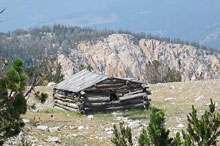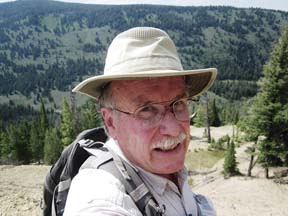No products in the cart.
Of Mountains and Mines

Scrambling in the Lemhi Range
Story and Photos by Ray Brooks
The promise of scenic high mountains full of historic mines lured me in July 2013 to Spring Mountain Canyon, which extends west from Hwy 28 into the Lemhi Range just south of the ghost town of Gilmore.
I had discovered the canyon in 1990 on a Forest Service map that showed a road crossing the Lemhis from the Little Lost River drainage over a remote and high pass to the Birch Creek drainage near Gilmore. The map also showed several mines near the pass, and since becoming a rock hound at age six, I’ve always been interested in old mines and the state’s mining history. On that first trip, my wife Dorita and I, and two friends from Salt Lake City, drove our two 4WDs from the Little Lost side up a rough and steep road to the pass. The road down the other side was blocked by snowdrifts, but during our short visit we were able to drive a surprisingly good road a couple miles south along the high ridge to old cabins, mines, and great views.
I thought it would be intriguing to do more mine exploring and high-altitude hiking in the area but didn’t make it back until 2010, when I entered from the east side and explored most of Spring Mountain Canyon and its northern tributary, Quartzite Canyon. By then, I owned and had studied books on the geology and mining history of the Lemhi Range.
This time, I planned on climbing several of the local mountains alone. I have a long history of climbing mountains in remote areas, with companions and by myself, and I knew that a solo mountain trip in a remote area with no cell-phone service meant I would have to be cautious at times, without anyone to help if I had an accident. But the joy of a solo trip to the mountains was that I could pursue my goals and interests at a pace that suited me.
This content is available for purchase. Please select from available options.
Purchase Only
Purchase Only

